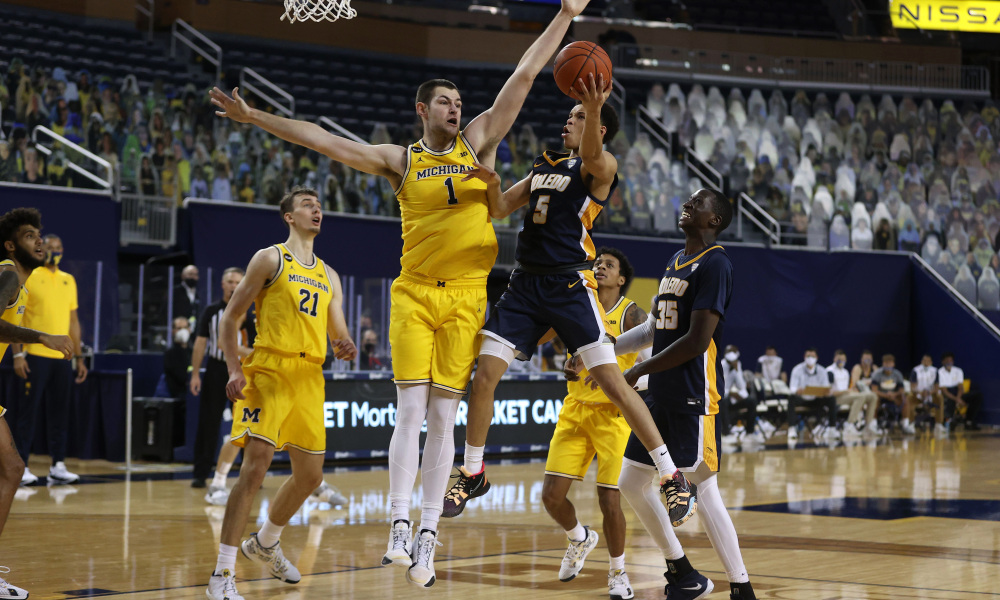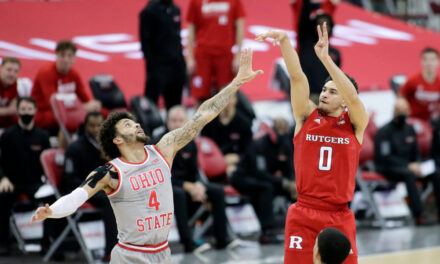Michigan basketball finished 5-0 in their series of non-conference games to start this season, and it’s a fair statement so far to say they will be an NCAA Tournament team. How far they go is still a very unanswerable question at this point, but Michigan looks like a solid squad with a good starting lineup and some firepower off the bench.
In the first game of the season, the Wolverines beat Bowling Green by 14 points, with a final score of 96-82. Michigan did a great job of spreading the ball around, with 5 guys scoring in double figures.
Isaiah Livers had a good game with 17 points, 9 rebounds, and 3 assists on 50% shooting and 3-8 from beyond the arc. Mike Smith, the transfer from Colombia, had a good game as well with 16 points and 8 assists while shooting an efficient 4-6 from the field. Hunter Dickinson showed he was a force to be reckoned with, scoring 11 points with 8 rebounds off the bench. Chaundee Brown, another transfer, provided Michigan with a much needed second-half spark, as he scored 19 points, grabbed 4 boards, and had 3 assists on 6-8 from the field, 5 of those buckets being three-pointers.
For Bowling Green, 3 guys did everything for them in their loss, as Justin Turner scored 24 points, Trey Diggs dropped 21, and Daeqwon Plowden scored 15 with 7 boards.
In terms of team stats, Michigan out-shot Bowling Green 54.1% to 37.1%. However, Bowling Green shot better from 3, as they made 41.4% of their 3-pointers to the Wolverines’ still efficient 37%. Both teams got to the line well, as Michigan had 26 free throw attempts, and Bowling Green had 22.
The Wolverines, with help from their big forwards and centers, won the rebounding battle 44-34, and moved the ball better, notching 11 more assists than Bowling Green at 23-12. Michigan didn’t let Bowling Green lead all game long, and Michigan was, at one point, up by 19. Both teams kept it relatively clean, as Michigan only had a decent 10 turnovers to BG’s 6.
The next game, however, is when things started to not look too good for Michigan, in an overtime win against who was an 0-3 Oakland team by 10. However, Isaiah Livers had yet another solid game, with 22 points, 3 boards, and 3 assists on good shooting percentages with 4 blocks. Hunter Dickinson was the MVP of this game, however, with 19 points, 4 rebounds, and 4 assists, with most of his points coming in overtime where he absolutely dominated and carried an otherwise stagnant Michigan offense to a victory.
What was the issue with this game besides the score? Michigan shot 46.8% from the field to Oakland’s 32.8%, so it wasn’t the shooting. Both teams massively struggled from the 3-point line, with neither team shooting even 30%. Michigan won both the offensive and defensive rebounding battles, and heavily out-assisted Oakland. So what was the issue in this game? Turnovers. Michigan had 20 turnovers this game, with 16 of them coming in the first half.
Not only did the Wolverines let Oakland’s top scorer Jalen Moore end the game with 21 points, but they also couldn’t handle the 1-3-1 zone that Oakland was running, largely because they were missing their open 3s and turning the ball over.
Isaiah Livers had 2 turnovers, Franz Wagner had 5 along with Eli Brooks, and Mike Smith had 3 turnovers while only scoring 2 points. Michigan did a great job of limiting turnovers in the second half and overtime, but Michigan still was missing a lot of open threes, causing easy points and fastbreaks for Oakland on the other end, and ruining momentum.
Luckily for the Wolverines, Hunter Dickinson is on their roster, but it’s fairly obvious that Michigan would’ve lost this game without him, and are very lucky that they have him.
The next game against Ball State was much better for Michigan and showed that they can be a great team that works together well, much as they did against Bowling Green in the first game of the year.
Though K.J. Walton scored 20 points for them, and Luke Bumbalough scored 13 on pretty efficient shooting, those guys were really their only big contributors. For Michigan however, they had a few guys have some good games. Isaiah Livers did Isaiah Livers things, scoring 21 points and tallying 3 rebounds and 2 assists on 8-11 shooting.
Franz Wagner had a much needed bounce-back game with 14 points and 6 rebounds on 4-6 from the field. Mike Smith had a well-rounded night with 10 points, 3 boards, and 3 assists. Hunter Dickinson came off the bench again and did his thing, recording a double-double with 12 points and 11 rebounds. Chaundee Brown also scored 9 points and shot 4-7 off the bench.
Michigan once again scored efficiently from the field, outshooting Ball State 55.9% to 39.3%. Michigan struggled from beyond the arc again at 4-15, but they held Ball State to a not great but not terrible 7-20. The Wolverines also continued their rebound dominance, grabbing 41 boards to Ball State’s 26.
Michigan and Ball State both had 13 turnovers and 18 fouls apiece, which shows that turnovers are still something that Michigan can and should definitely work on limiting. At one point, Ball State led by 2 points, but Michigan’s largest lead of the night was at 25 before they put their third-stringers in to get some practice minutes toward the final stretch of the game when a win was in the bag.
In a matchup that looked great, but contradictorily worrisome in the middle of the first half, the Wolverines improved to 4-0 on the season, blowing UCF out of the water 80-56. The best and worst part of this game was Isaiah Livers’s questionable production with only 5 points on 2-9 shooting. How was this good, you may ask? For one thing, it showed that while Livers is often Michigan’s best and most reliable offensive option, they have other pieces that can step up on an off-night for Livers, which is very promising.
Chaundee Brown scored 18 points off the bench with 4 3s, Hunter Dickinson came in and scored 14 off the bench with 7 rebounds, and Terrance Williams, a freshman that shows great hustle, effort, and work ethic, scored 10 points and grabbed 6 boards on top of that. Eli Brooks had a 10 and 5-assist game at the starting shooting guard position, and Wagner had a decent game with 8 points, 5 boards, and 3 assists on 4-6 shooting.
On the defensive side of the ball, Michigan of course gave up only 58 points, with 21 of those being scored by Darin Green Jr. Michigan shot a bit better from 3 than in past games at 33.3% while holding UCF to 31.3%. The Wolverines shot great from the field at 49.2% and held UCF to 35% on the dot. Michigan won the rebound battle, (a consistent event) 44-29.
The boys in maize and blue dropped 18 assists, showcasing their teamwork and chemistry, and held UCF to 9. It was a decently clean game overall for both teams, as UCF won the turnover battle 10-9, and they tied fouls at 14. UCF had a 10 point lead in the middle of the first half, but Michigan surged back and eventually were up by 32 late in the game.
In their last non-conference matchup game of the year before the NCAA Tournament, Michigan blew out Toledo in a game that was supposed to be played against NC State in the Big Ten/ACC Battle by 20 points, 91-71. When I say everyone contributed for Michigan, I mean everyone contributed for Michigan. Isaiah Livers bounced back with a 16 point game with 6 rebounds, and Austin Davis was having his best game of the season with 12 points and 3 boards, (who sadly got injured in the first half).
Wagner had a good night with 14 points, 5 boards, and 4 assists on 4-8 shooting, and Eli Brooks had 12 points, 3 assists, and 3 boards on 5-12 shooting and 2-4 from beyond the arc. Mike Smith had 7 points with 7 assists, showcasing that he’s a good playmaker that can find open shots for other guys and spread the ball around.
Hunter Dickinson came off the bench, scored 18 points, and grabbed 7 boards in another efficient and size-dominant game for him, and Chaundee Brown scored 9 points with 3 assists on 4-4 shooting.
Michigan, as always, out-shot their opponent, this time 57.6% to 40.6%. Michigan re-gained their 3-point confidence and shot back, shooting 56.3% while holding Toledo to 37.5%. Michigan, once again, won the rebounding battle, but this time only by 5, 35-30. The Wolverines spread the ball around as usual, with 20 assists to Toledo’s 12, and did a good job limiting turnovers with only 8 while forcing 14. While Toledo led by 2 early in the game, Michigan held a lead of 26 late in the game.
Takeaways:
From the first 5 games of the year, some strengths and weaknesses were shown about this squad.
Strengths:
- Rebounding
- Michigan out-rebounded their opponent in every single game so far this season, led by Hunter Dickinson, Franz Wagner, and Isaiah Livers.
- The Wolverines average 41.8 RPG so far this season.
- Livers and Dickinson
- Both of these guys, (minus an off-game from Livers so far), have been astounding for this team night-in, and night-out. Dickinson has provided a spark off the bench in just about every game this year, and Livers is essentially a walking 15 points right now.
- Livers is currently shooting an insane 48.1% from 3 so far, and 56.5% from the field along with 16.2 PPG, showing that he scores a lot, and does it efficiently.
- Dickinson is averaging 14.8 points and 7.4 rebounds per game, providing a double-double threat and a scary sight for opposing teams whenever he enters the game at 7’1″ and 255 pounds, as he often gets double or triple-teamed whenever he touches the ball in the paint.
- Assists
- Michigan has been spreading the ball around well this year, especially Mike Smith and Eli Brooks, who average 5.2 and 4 assists respectively at the starting guard positions, which is great for the chemistry of this team, and shows that they’re finding open looks.
- Efficiency/Buckets
- Michigan is shooting 52.6% from the field so far this year while averaging 86.4 points per game as a team.
- Defense
- Even though Michigan gives up a decent amount of points per game, that is more a result of them playing fast-paced basketball rather than playing bad defense. In fact, their defense has been solid, as they are causing teams to shoot poorly from the field and take tough shots, which also ties into why Michigan gets so many rebounds.
Weaknesses:
- Turnovers
- While Michigan is spreading the ball well and getting open looks, they have made some careless decisions leading to turnovers, as they average 12.2 of them per game, and a 20-turnover game against Oakland in the second game of the season doesn’t help the cause.
- 3-point consistency
- The Wolverines have shown that they can shoot the rock from beyond the arc, but it’s not every game. Sometimes, they’ll shoot 40% or higher from deep, and other games get limited to under 25%. While teams do have their ups and downs, Michigan needs to be more consistent from 3 if they want to make a run in any tournament this year.
- Weak schedule
- While this isn’t something you can really blame on the players, their stats can be misleading since they haven’t played a big, (or B1G) school this season yet, as Michigan’s gone up against teams from the MAC, Horizon, and AAC.
Photo Credit: WolverinesWire





